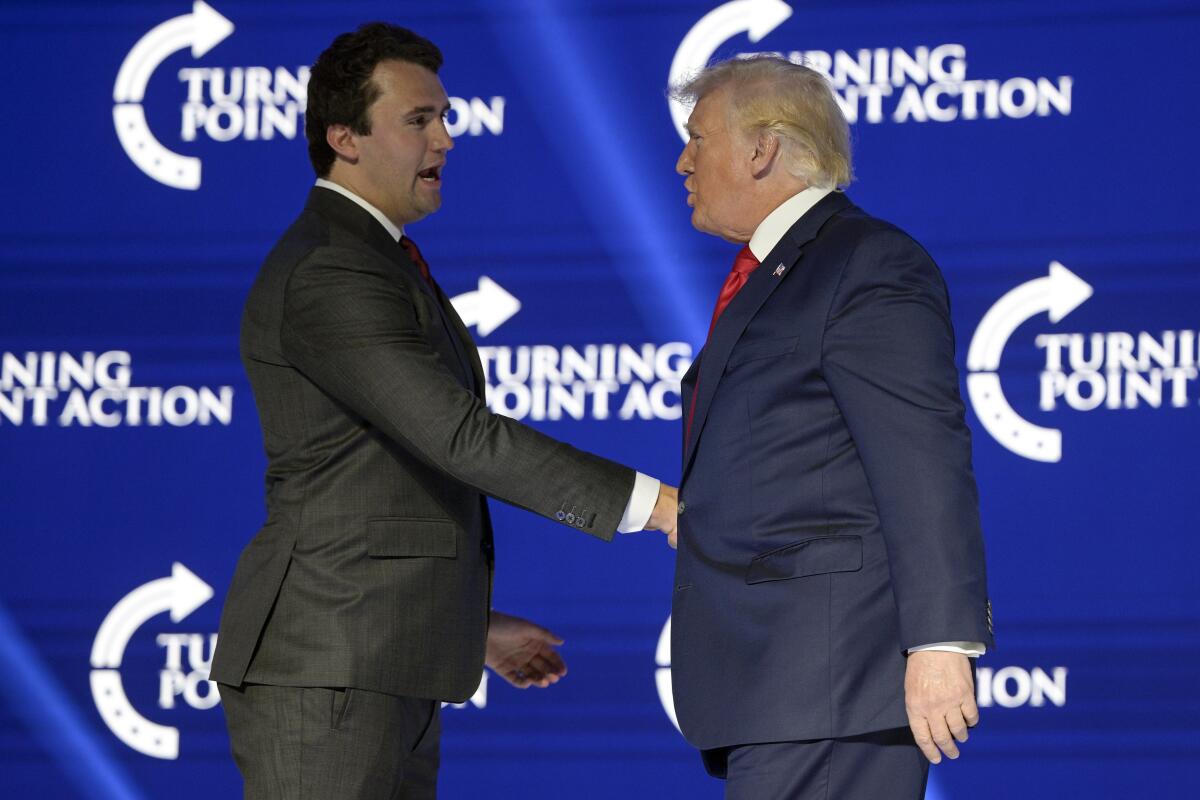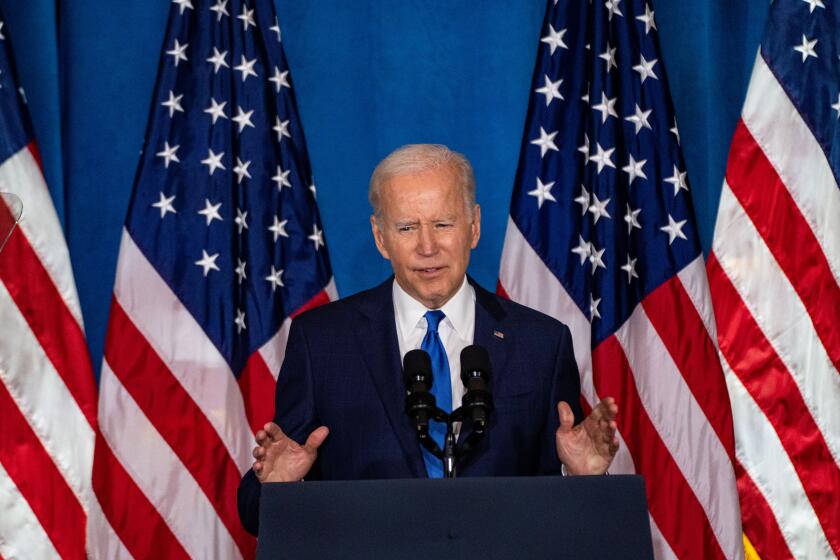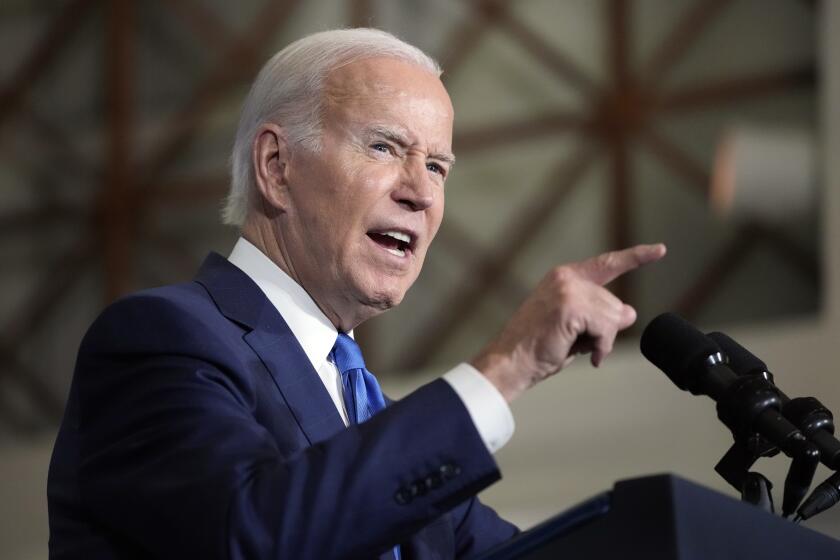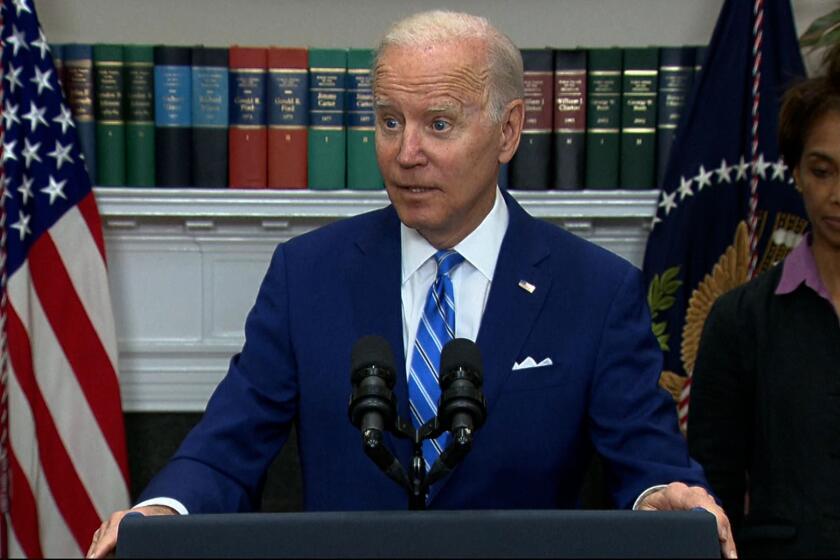How Trump’s MAGA movement helped a 29-year-old activist become a millionaire

- Share via
WASHINGTON — Charlie Kirk’s $4.75-million Spanish-style estate is tucked away in a gated Arizona country club that boasts a guest casita, “resort-style” pool and striking views of the Sonoran Desert.
The Make America Great Again political movement has been lucrative for Kirk, the 29-year-old chief executive and co-founder of the conservative youth organization Turning Point.
The nonprofit rocketed to prominence by latching on to Donald Trump’s 2016 campaign and has raised roughly a quarter-billion dollars since. The organization has also enriched Kirk and his allies, according to an Associated Press review of public records, which found top Turning Point officials collected pricey salaries, enjoyed lavish perks and steered at least
$15.2 million to companies that they, their friends and associates are affiliated with.
But for all that money, Turning Point has struggled to help Republicans win general elections, particularly in their adopted home of Arizona, where their slate of Trump-allied candidates lost statewide races last year.
Now Turning Point’s leaders are attempting to branch out, pitching a $108-million get-out-the-vote campaign that would expand beyond Arizona to Georgia and Wisconsin.
With the midterm elections days away, the president delivers a warning about political violence and the future of American democracy.
That’s become a source of frustration for some Republicans who point to the group’s limited electoral success as well as the hefty sum they now seek, setting up a potential clash that could complicate the GOP’s election efforts next year.
“Any donor who thinks an organization needs $108 million for a three-state grassroots get-out-the-vote campaign is being taken advantage of,” said Erick Erickson, a nationally syndicated conservative talk radio host and frequent Trump critic. “It sounds like a grift.”
In a statement, Turning Point spokesman Andrew Kolvet said none of the group’s leaders has inappropriately benefited from their financial arrangements. If anything, he said, many were underpaid for their talents.
“If the so-called ‘experts’ know what it takes to build successful ballot-chasing teams, why are conservatives apparently so bad at it?” Kolvet said.
Turning Point was founded in suburban Chicago in 2012 by Kirk and William Montgomery, a tea party activist, to proselytize on college campuses for low taxes and limited government.
Democrats and Republicans agree that democracy faces a crisis, but they disagree about the nature of the threat, and each side blames the other.
Despite early misgivings, Turning Point enthusiastically backed Trump after he clinched the GOP nomination in 2016. Kirk served as a personal aide to Donald Trump Jr., the former president’s eldest son.
Soon, Kirk was a regular presence on cable TV, where he leaned into the culture wars and heaped praise on the then-president. Contributions to the group skyrocketed, climbing to $79.2 million in 2022, records show.
Compensation also soared, with Kirk’s climbing from $27,000 in 2016 to more than $407,000 by 2021, tax records show. He bought three high-end properties, all worth more than a million dollars. Millions more were paid out to a cluster of companies linked to a handful of group leaders and their allies, according to tax filings and business records.
Kolvet said that much of Kirk’s wealth was derived from his successful podcast and radio show, as well as public speaking fees, though he declined to provide earnings figures.
Yet specifics about how exactly Turning Point spends its money — and who benefits — are often difficult to discern because the IRS does not require nonprofit groups to publicly disclose detailed accounts of their expenditures. Meanwhile, many of Turning Point’s biggest vendors are limited liability companies that are registered in states that do not require public disclosure of ownership.
President Biden warns that if the Supreme Court strikes down Roe vs.
One branch, the Turning Point Endowment, held more than $55 million in reserve in 2022, while donors were courted to give more.
Kolvet said the money was part of Turning Point’s “50-100 year plan to continue reaching generation after generation of young Americans.” He added that the organization’s leaders were “good stewards of donor money.”
While building for the future, however, Turning Point has shown a willingness to spend lavishly.
In 2019, the group stated that its leaders would travel first-class or by charter plane, explaining later that it was sometimes needed to “ensure the uninterrupted success of the organization’s mission.”
In 2021, Turning Point sponsored a wedding reception for Kirk and his wife, Erika Frantzve, at the Fairmont Scottsdale Princess luxury hotel, which was also billed as a ninth anniversary celebration and fundraiser for the organization.
Kolvet said the event was separate from the couple’s small wedding ceremony, describing it as an “elegant and gracious way for Erika and Charlie to mark a landmark in the life of TPUSA [the 9th anniversary] while also inviting a much larger group of friends and family to celebrate a landmark in their own lives.”
California election law allows items with slogans at voting locations, as long as no candidate or campaign’s name is displayed.
Other expenditures defy easy explanation.
A $999,000 payment was made to a limited liability company in Nevada for a “research project on educational outputs,” according to 2020 tax documents. The company, called Clocktower LLC, was dissolved in 2022 and the only corporate officer listed in its business filings is the president of a firm that advises on tax avoidance strategies.
“Any insinuation that anyone” at Turning Point “benefited from this is defamatory,” Kolvet said.
In 2020, Turning Point paid Trump Jr. $333,000 through his company Pursuit Ventures. Kolvet said the money was used to buy copies of a book he wrote that was offered as a gift during a fundraising drive.
During the 2020 presidential campaign, Jake Hoffman, one of the group’s primary consultants, recruited teenagers to spread false information online about voter fraud and the COVID-19 pandemic.
One of Hoffman’s companies was paid $2.4 million during that period, according to tax documents that listed the purpose of the expenditures as “digital education” and “ad placement.” Hoffman did not respond to a request for comment.
Standing in a drizzle in this southwestern Iowa city, in a line that snaked around the arena and an adjacent field house, the people in red hats and raincoats were nonetheless cheery and eager, even those who traveled hours to be there.
Other high-ranking employees also received a growing share of the organization’s wealth, according to business filings and tax documents, which show Turning Point paid millions to limited liability companies they set up, or serve on.
Legal experts say the payments could potentially pose a problem under federal tax regulations if the sums are deemed to be excessive, though enforcement is rare.
As Kirk’s star has risen, Tyler Bowyer, Turning Point’s chief operating officer, has assumed a greater role in the organization.
Now he operates Turning Point’s political arm, earning compensation of $255,000 in the group’s 2022 fiscal year. Bowyer is also helping lead a commercial endeavor that could prove lucrative.
Business filings show Bowyer recently became chairman of the board for Superfeed Technologies, a mobile app maker that developed the platform Turning Point will use to manage its $108-million get-out-the-vote campaign.
Kolvet said that Turning Point’s leaders have not “earned a dime” from the company.
More to Read
Get the L.A. Times Politics newsletter
Deeply reported insights into legislation, politics and policy from Sacramento, Washington and beyond. In your inbox three times per week.
You may occasionally receive promotional content from the Los Angeles Times.















